
Top stories


ESG & Sustainability#BudgetSpeech2026: SRD grant unchanged, other Sassa social grants see hike
9 hours



More news












ESG & Sustainability
South Africa’s carbon tax should stay: climate scientists explain why










“Our sunglasses are made from locally sourced wood veneer offcuts, recycled paper and tree sap bio-resin that are pressed, cut and shaped by hand. At our workshop in Woodstock, every pair goes through a series of 22 processes each done by one of our specialised craftsmen. We have worked hard to improve our craft and can now produce around 50 pairs a day – efficiency is a focus with each unique pair still completely handcrafted. I love that to make more sunglasses I have to employ more people,” says founder and owner, Alistair Barnes.
The name Ballo is a combination of family names and stems from the Italian term “I dance”. Barnes is so focused on creating a brand that is genuine from every angle that he names each new design after a friend, like the Santini and the Gallo.
In an ongoing search for more sustainable products and more efficient systems, Ballo has settled on hemp and wood as their chosen raw materials. According to Ballo, although hemp is produced in China and shipped halfway across the world, it is still more sustainable than the likes of a much nearer option, Zimbabwean cotton. "This is because of the way in which hemp is produced – it is still better for the environment than driving trucks down from Zimbabwe. Alistair discovered this through extensive research and making use of the Zimbabwean cotton as a comparison to the Chinese hemp."
As with all new brands, over the years, Ballo has endured a roller-coaster ride in an attempt to produce a quality product that is completely responsible and sustainable. The workshop uses no water during the production process, minimal electricity, very few yet highly skilled staff and almost entirely recycled raw materials.
Each pair of sunnies are put together by hand and whether it be polishing the arms or pressing the layers together, nothing is automated. The manufacturing process is carefully thought out - from the resins to the wood, nothing is wasted. To further reduce waste, the company makes use of the offcuts and hemp products from the production line and reworks them into anything from pots for plants to laptop stands. Even the clothing racks at the Ballo store in Bo-Kaap are made from alien trees and dowels instead of screws and nails.
The brand also sponsors the South African Eco Film Festival, which is geared towards showcasing films that introduce sustainable living choices and world issues alike.
Ballo is one example of a local company considering the environmental effects of their products throughout its lifecycle, from conception to manufacturing and finally retail.